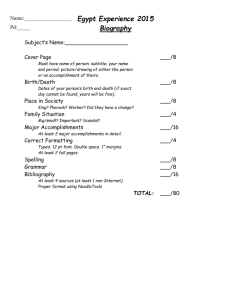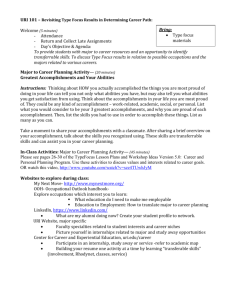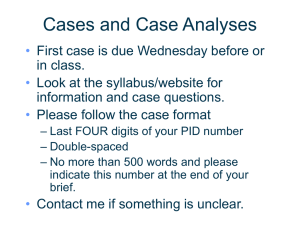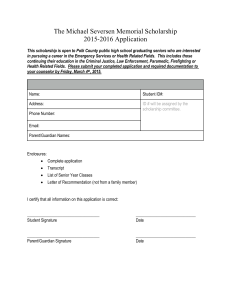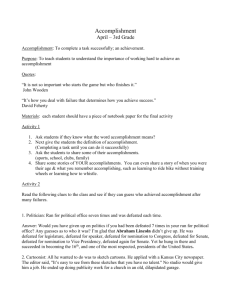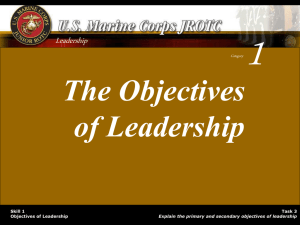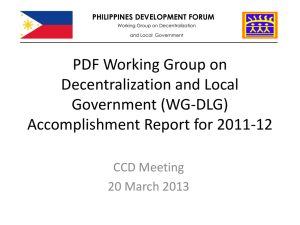How to Write an "Accomplishment Essay"
advertisement
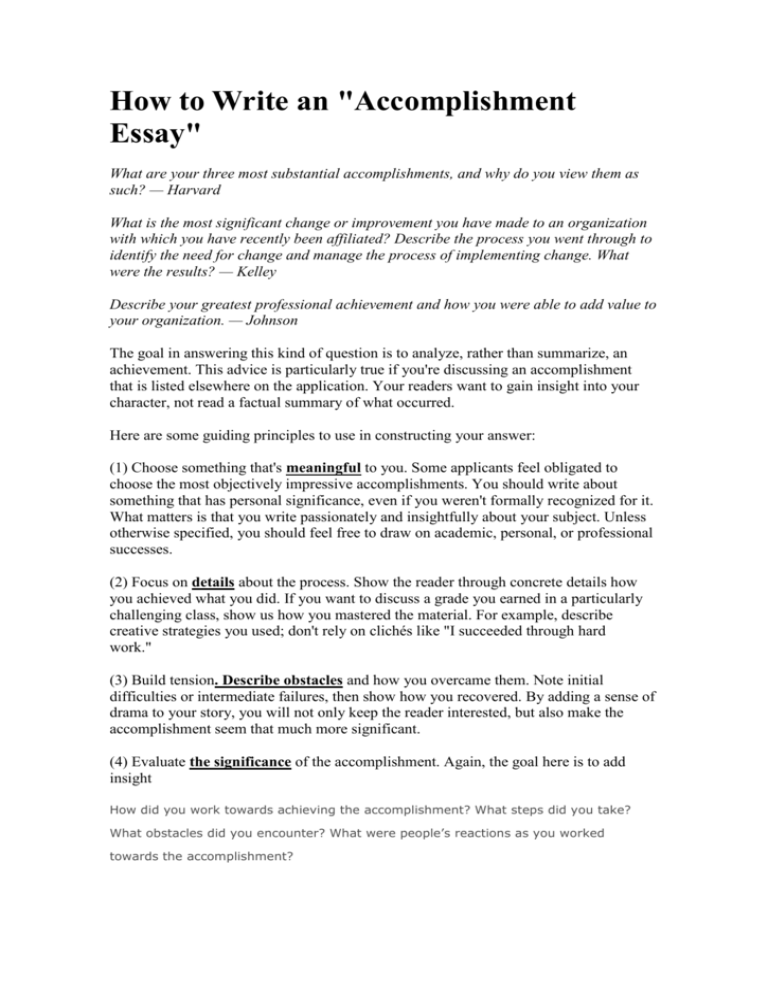
How to Write an "Accomplishment Essay" What are your three most substantial accomplishments, and why do you view them as such? — Harvard http://www.free-essay-wr iting- topics.com/index.php?p age=mba-a pplica tion-accom plishment-q uestion s What is the most significant change or improvement you have made to an organization with which you have recently been affiliated? Describe the process you went through to identify the need for change and manage the process of implementing change. What were the results? — Kelley Describe your greatest professional achievement and how you were able to add value to your organization. — Johnson The goal in answering this kind of question is to analyze, rather than summarize, an achievement. This advice is particularly true if you're discussing an accomplishment that is listed elsewhere on the application. Your readers want to gain insight into your character, not read a factual summary of what occurred. Here are some guiding principles to use in constructing your answer: (1) Choose something that's meaningful to you. Some applicants feel obligated to choose the most objectively impressive accomplishments. You should write about something that has personal significance, even if you weren't formally recognized for it. What matters is that you write passionately and insightfully about your subject. Unless otherwise specified, you should feel free to draw on academic, personal, or professional successes. (2) Focus on details about the process. Show the reader through concrete details how you achieved what you did. If you want to discuss a grade you earned in a particularly challenging class, show us how you mastered the material. For example, describe creative strategies you used; don't rely on clichés like "I succeeded through hard work." http ://www.free-essay -writing-topics.com/index.ph p?page=mba-application-accomplishment-questions (3) Build tension. Describe obstacles and how you overcame them. Note initial difficulties or intermediate failures, then show how you recovered. By adding a sense of drama to your story, you will not only keep the reader interested, but also make the accomplishment seem that much more significant. http://www.free-essay -writing-topics.com/index.php ?page=mba-application-accomplishment-questions (4) Evaluate the significance of the accomplishment. Again, the goal here is to add insight How did you work towards achieving the accomplishment? What steps did you take? What obstacles did you encounter? What were people’s reactions as you worked towards the accomplishment? Why was the accomplishment so important? How was your accomplishment viewed by others? If it was a professional accomplishment, how did it impact your company? Can you measure it in concrete terms? If it was a personal accomplishment, how did it affect your life? Be specific! A narrative essay is simply a personal story, and we all have at least a few of these to tell. Sometimes plays and movies have a narrator, a person who stands to the side and tells his or her story. The narrator describes actions as well as thoughts and feelings. For the purpose of this lesson, you are the narrator. The story you choose to write will be your narrative essay. One of mine was published in a national magazine in 1999. I wrote about my personal experience with adoption. Many magazines publish personal narratives; readers are interested in other people's lives and how they handled danger, conflict, or uncertainty. Unlike some other essay forms, the narrative essay is written in the first person viewpoint. Because this is your story, you can pepper it with the words "I," "me," "my," and "mine." This is a personal experience piece. While an opinion essay would also be written in first person, it would dwell more on thoughts and ideas than on events. Your narrative essay will be event-driven. This is an example of the accomplishment essay: One of my most important accomplishments occurred during my association with a restaurant chain, for which I served as director of real estate. As a relatively new corporation, this business realized that it could only grow by opening more outlets. I played a key role in helping it achieve that critical objective. I was responsible for opening nine additional stores (there were six when I joined the company), which brought company sales from just under $10 million to $27 million by the time I left. It was my assignment to find and lease appropriate sites for our new restaurants. This was a complicated process for a number of reasons. For one, due to construction restrictions and a brisk economy, there were very few buildings available in the Greater San Francisco Bay Area. This created a landlords' market, with high rents and conditions not generally conducive to restaurant expansion. In this environment, I had to be especially resourceful and aggressive in order to do my job. Then, once I found a location that met with top management's approval, I was in charge of negotiating the deal. Such deals are complex because one is negotiating not only with landlords and attorneys but also with space planners, contractors, the city, and the health department. In the case of spaces in regional malls, I often had to work with the in-house architect and construction supervisor, as well as with the owner's design review committee. It was necessary to understand and comply with the requirements of all these various entities, although negotiation was always very much a part of the process. In my earlier experience as a broker with a major real estate firm, I operated from a different position, representing a buyer or a seller. As real estate director for a corporation, I was suddenly an in-house principal, part of a corporate team, and it was essential that I take into account how the details of each deal would affect our business. The restaurant chain is a real estate-driven business, so my work and accomplishments were particularly vital to the company's success during this crucial phase of its development. Another of my most important accomplishments was helping the homeless through my work for a foundation, of which I am a co-founder. This experience was remarkable because it afforded me the privilege of making a positive difference in the lives of others. The foundation achieves its goals in a number of ways. For example, for one local Family Living Center, we brought together builders and developers (who provided their services on a volunteer basis) to upgrade existing facilities, some of which were quite old and decrepit. I coordinated the work of construction teams doing the improvements. I would define the scope of the project and then assist the general contractor in subcontracting the work. I also had to go through the city permit process, which was quite unusual due to the fact that ours was a structure for the homeless. Also, for three consecutive years, I was the operations man for a major 10K Race for the Homeless, which I originated and which was designed to raise both money and the public's consciousness of this problem. Each year about six months of planning and work would be required to set up the event, which involved many elements. Among other activities, I had to coordinate all aspects of the race with the city, police, and fire departments, establish the course and have it certified, secure the cooperation of affected neighborhood groups, and set up a complex management structure (to recruit and train volunteers as well as handle a myriad of other details). During the three years I was involved, participation in the event increased threefold and the amount of funds raised increased fourfold. During a recent spring, I was presented with an opportunity to make a big difference in another person's life. At that time there was a six-car pileup on a highway in northern California. Heading north on the freeway just moments after this accident occurred and when the road was still open, I found my attention riveted to one particular car— crushed like an accordion—that was on fire with its driver still inside. I quickly pulled to the side of the highway, parked my car, jumped out, and ran to the car on fire. Its occupant, a teenage boy, was in a state of shock. I attempted to calm him down and then, with the help of another motorist, I used a crowbar to open the car's door. I extricated the driver from the wreckage and carried him to the side of the road before his car became totally engulfed in flames. The boy suffered a broken leg and hip, but he survived. My act was heralded in the newspapers and recognized by a citation from the highway patrol and the county in which the event occurred, but this hardly equaled the feeling I received from having saved this boy's life. Mine was a totally spontaneous and unpremeditated act, but I regard its consequence as one of my greatest accomplishments. COMMENTS: This applicant discusses three accomplishments. The first is a professional achievement with specific details about both the difficulties he encountered and the contributions he made. His second accomplishment stems from his involvement in his community. Note that he makes the following unnecessary statement: "This experience was remarkable because it afforded me the privilege of making a positive difference in the lives of others." Although this is certainly true, the writer would be better off showing the difference he has made and leaving it at that. Nevertheless, the overall account is still strong, because he does return to focus on specific duties he had and results for which he was responsible. His final accomplishment falls under the category of a personal achievement. Note that he is able to avoid sounding boastful by acknowledging but downplaying praise: "My act was heralded in the newspapers and recognized by a citation from the highway patrol and the county in which the event occurred, but this hardly equaled the feeling I received from having saved this boy's life." Few of us have been involved in saving another person's life, but this story provides a strong model of engaging dramatic narration and effective use of detail. The writer does not need to spend many words evaluating the significance of his story, because the details have already revealed so much to the reader about his character. Another example: During my life I had some accomplishments. But, I will tell you the truth I cannot call them as my great accomplishments. At this point of my life I had the two greatest events. My first event was_____________________---. The second event, which was the biggest and the most unforgettable was _____________________First event that I accomplished was when___________________. Even though_____________________---, those days were the best moments of my life. I always knew that if I _____________________________________I would always make my parents and of course feel very proud. My parents are proud because I am their oldest child and I am the first who.....
